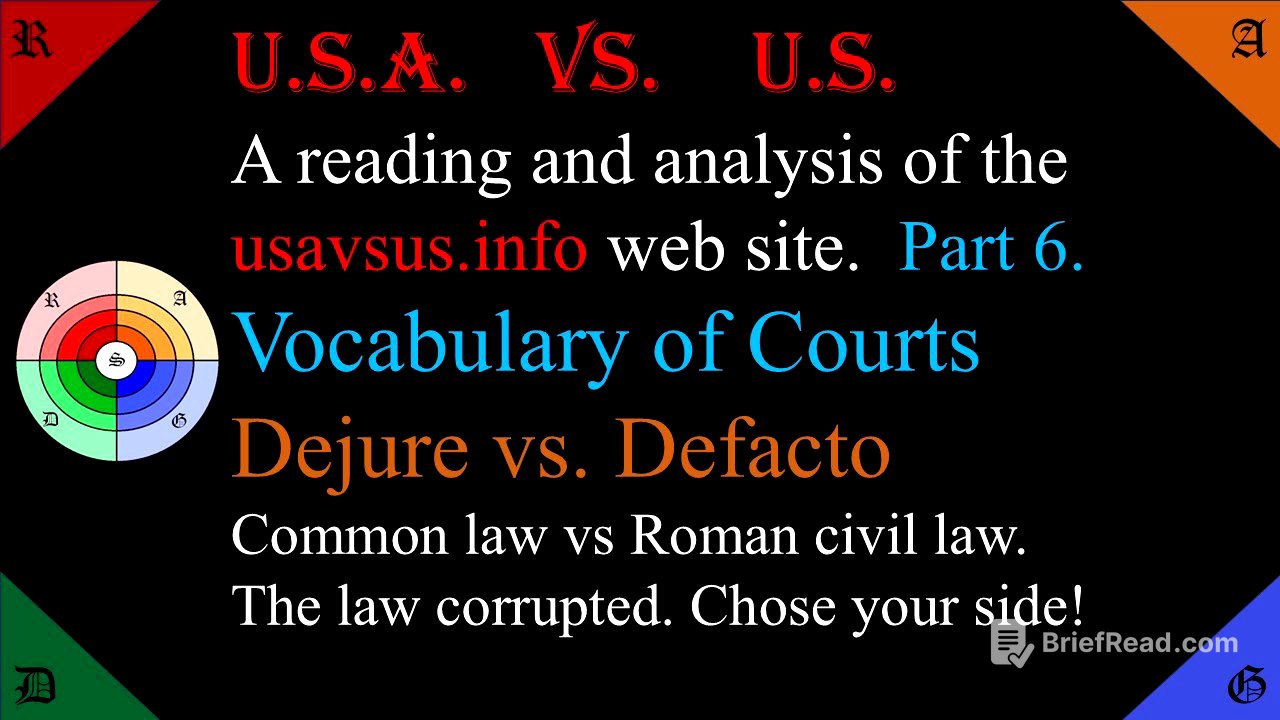TLDR;
This session of the Vocational Science of Freedom class focuses on analysing the "USA versus US" website, specifically examining the terms and concepts presented, and comparing them against definitions from Bouvier's Law Dictionary (1856 edition). The discussion covers the Comprehensive Annual Financial Reports (CAFRs) and their implications, and also addresses the accuracy of the website's classification of legal terms as either "de jure" (by right) or "de facto" (by fact).
- CAFRs expose corporate government fraud by revealing hidden investments and wealth.
- Many legal definitions on the "USA versus US" website are inaccurate or misclassified.
- Understanding legal terminology and reclaiming sovereignty are crucial for avoiding exploitation by corporate government.
Introduction [0:00]
The class will be the sixth reading of the website USA versus US. The show notes will include a layout of vocabulary words to be covered. Some definitions and ideas on the site are not entirely correct, so a vocabulary list has been compiled for tonight's class. The definitions in the vocabulary list will come from Bouvier's Law Dictionary, 1856 edition.
Comprehensive Annual Financial Report (CAFR) [1:47]
The Comprehensive Annual Financial Reports (CAFRs) are the bookkeeping records of the corporate government. Cities, municipalities, and counties all have CAFRs and Dun and Bradstreet numbers, which can be found on dnb.com. The Dun and Bradstreet number for each county is often linked to the district attorney. CAFRs reveal the extent of corporate government fraud, but have limited practical use in court cases beyond proving this fraud. Governments hide their annual financial reports and invest skimmed money in real estate and the stock market. Only one-third of government revenue comes from taxes, while two-thirds come from investments. Corporate government agencies possess enough wealth to abolish property and income taxes. The corporate government owns the majority of stock in American corporations, indicating a fascist state where government and corporations are merged. The vocational science of freedom status stocks aim to help people avoid taxes and corporate jurisdiction.
Suit vs. Action [10:17]
The website incorrectly classifies "suit" as "de jure" and "action" as "de facto". According to Bouvier's Law Dictionary, a suit is any proceeding in a court of justice where a plaintiff seeks a remedy, including civil actions and criminal prosecutions. An action is divided into criminal and civil types, with a civil action being a legal demand of one's rights. An original writ initiates an action at common law, containing a declaration with seven parts or a bill in equity with nine parts. Actions can be real (property-related), personal (trespass or damages), or mixed (land rights). For a deeper understanding, viewers are encouraged to watch the Vocational Science of Freedom classes on the totality of law and the ins and outs of court.
Crime, Accuser, and Accused [15:07]
The website's definition of "crime" as an injury requiring proof of harm is a tort. The "de facto" side incorrectly defines "criminal" as an adjective and "offense" as a policy violation. An accuser is simply one who makes an accusation. The term "plaintiff" isn't inherently "de facto," though it may hint at equity. A legal plaintiff holds legal title, while an equitable plaintiff is entitled in equity. The term "accused" isn't automatically "de jure"; the need to defend depends on the situation, not just the label.
Free Law Information [18:35]
The legal system is privately owned, but claims that all courts are owned by the Crown Temple in London lack definitive proof. Attorneys and judges largely act as agents of this system. US courts operate as admiralty courts under colour of law. Defendants are treated as wards of the court. The term "attorney" means to take from one and give to another. Attorneys and judges, as officers of the court, face a conflict of interest. Admiralty jurisdiction grants judges powers akin to a ship captain. Defendants often lack rights in court. Statutes primarily apply to fictitious entities or "infants" (as defined in 1 USC subsection 8). US courts have jurisdiction over 14th Amendment citizen slaves and infants, administering abandoned infant estates. Traffic tickets are often infractions processed through probate court. While individuals cannot be jailed for infractions, "infants" under contract (e.g., with a driver's license) can be. Plea bargaining is possible. Federal Reserve notes lack lawful consideration. Judges may use contempt charges or threats of commitment to a mental asylum to coerce payment. Contempt charges require disrespect to the judge or failure to follow court orders. The Jerome Daily case and the Peanut case are mentioned.
Accusation, Claim, and Injury [28:35]
An accusation is a charge made to a competent officer against someone who has committed a crime or misdemeanour. Failure to report a felony (misprision of felony) is also a crime. A claim is a challenge of ownership of something wrongfully withheld. The website incorrectly equates "claim" with "true bill" or "liable." Injury is a wrong or tort, divided into public and private, affecting personal or real property. Real property is land, while personal property is movable. Injuries can be absolute (threats, assaults) or relative (affecting rights of a husband, parent, or master). Injuries arise from non-feasance (not doing a legal obligation), misfeasance (improper performance), or malfeasance (unjust performance). Civil law defines injury as a delict committed in contempt or outrage, maliciously injuring body, dignity, or reputation, divided into verbal and real injuries.
Charge, Writ, and Motion [36:59]
A charge is the court's opinion to the jury on the law, not inherently "de facto." A writ is a mandatory precept issued by sovereign authority, compelling a defendant to act, returnable to the issuing court, and sealed. Types of writs include original, mense process, and execution. The website correctly notes writs are tools of common law, issued by almost anyone except US citizens. A motion is an application to a court for an order or ruling, supported by an affidavit. Bouvier's Law Dictionary states that the affidavit cannot be read during the hearing.
Submits, Writ of Error, and Venue [45:22]
The website incorrectly contrasts "emits writs" ("de jure") with "submits documents." A writ of error, a "de jure" action, challenges a court's error, distinct from an appeal. An appeal involves submitting a case to a superior court after a trial in an inferior tribunal. Appellate courts can alter or reverse anything the inferior court did. You cannot appeal anything from a court of record that was done correctly by jury trial. Venue is the county from which the jury comes, stated in every declaration. Local actions require the true venue, while in a transitory action, the plaintiff may lay the venue in any county he pleases.
Man, Person, and Sui Juris [50:44]
The website contrasts "man, woman, child" ("de jure") with "person" ("de facto"). Using "freeman" is preferable to "man" due to the definition of man as an animal in Roman civil law. "One of the people" is a good term to use. "Person" is defined as an infant according to 1 USC subsection 8. Husband, wife, or spouse lacked verification in either direction. "Sui juris" (of one's own right) describes someone with all the rights of a freeman, not under another's power, essential for valid contracts. Everyone of full age is presumed to be "sui juris". The opposite of that is to be an infant. The website incorrectly defines "pro se" as representing oneself in person or mask as a fiction.
Affirmation, Declaration, and Affidavit [59:03]
The website contrasts "affirmation" ("de jure") with "affidavit" ("de facto"). An affirmation is written testimony of facts. A declaration is a methodical and logical specification of the circumstances which constitute the plaintiff's cause of action. In real actions, it is most properly called the count. A declaration at law answers to the bill in chancery. An affidavit is a written oath or affirmation before an authorized officer, differing from a deposition in that the opposing party has had no opportunity to cross-examine the witness. An affidavit to hold to bail is required before the defendant can be arrested. A preliminary hearing must be had to determine the ability of the court to hold the accused.
Exception and Lawyer [1:08:28]
The website contrasts "speak the truth" ("de jure") with "oath" ("de facto"), and "I do not accept" with "I object." After a judge overrules an objection, one can say "exceptions." An exception is an objection to a judge's decision during a trial. A bill of exceptions documents these objections. A lawyer is one learned in the law, requiring no license or registration. The law is simple: do not cause damage, harm, loss, or injury to anyone or their property and uphold all contracts. An attorney is an esquire, a title meaning shieldbearer. Attorneys swear an oath to uphold the court.
Attorney and Client [1:19:08]
The bar association is registered with the Internal Revenue Service as a 501c3 organization. The California Bar Association was incorporated in 1901 and ceased to exist in 1951. When only attorneys can understand the codes, statutes, and regulations, then only attorneys should be required to obey them. Hiring an attorney makes one a ward of the court. An attorney's first duty is to the courts and the public, not the client. Clients are also called wards of the court in regard to their relationship with their attorneys. Wards of court are infants and persons of unsound mind.
Supreme Court and District Court [1:21:06]
The website contrasts the Supreme Court of the United States ("de jure") with the United States Supreme Court ("de facto"). United States of America District Courts were implemented for territories that were not states.
Prosecutor and Counsel [1:21:44]
In the early days of the republic, a prosecutor was simply anyone who voluntarily went before the grand jury with a complaint. A prosecutor on the "de facto" side is a government official who conducts criminal prosecutions on behalf of the corporate state.
Rights and Freedoms [1:22:59]
"De jure" maintains rights, freedoms, and liberties of the people. "De facto" has no rights except civil rights and privileges that can be taken away at any time and restricts freedoms and liberties. "De jure" has unalienable, fundamental, and substantive rights protected by the organic constitution. "De facto" US citizens are at the mercy of government and cannot sue the master corporate government unless allowed to. The first 10 articles of the amendment to the constitution are sometimes referred to as the bill of rights which is incorrect. "De jure" requires due process. "De facto" due process is optional.
Innocent Until Proven Guilty [1:25:09]
"De jure" is innocent until proven guilty. No bill of attainder. No ex post facto law shall be passed. "De facto" is guilty until proven not guilty. The so-called judge will ask if one is guilty or not guilty. Always claim to be innocent. "De jure" jurors judge the law as well as the facts. Jury nullification occurs when a jury returns a verdict of not guilty despite the common belief that the defendant is guilty of the violation charged. "De facto" the judge instructs the jurors to try only the facts, not the code statute, etc.
Crime and Courts [1:27:59]
"De jure" a crime is an offense against a public law. "De facto" all crimes are considered commercial crimes. Poor people have access to the courts the same sense that Christians had access to the lions. Most courts have become the collection agency of the corporate government system for the debt created by said system to be paid in part by the people who come before the so-called court.
Lawful vs Legal Determination [1:31:55]
"De jure" lawful determination so the people's one supreme court is the county court of record. "De facto" legal determination. There is no lawyer or judge that can or will go against this colorable system. Since Erie Railroad versus Tompkin's decision in 1938, the courts have been operating under public policy in the interest of the quote unquote nation's creditors instead of public law in accord with the Constitution. The judges are not allowed to consider any case law prior to 1938.
Responsibility [1:39:59]
"De jure" everyone is responsible for their actions and words spoken. "De facto" the United States Supreme Court gave full immunity against both civil and criminal prosecutions for perjury to judges, attorneys, court reporters, stenographers, law enforcement officers, and export witnesses who testify for the state.









